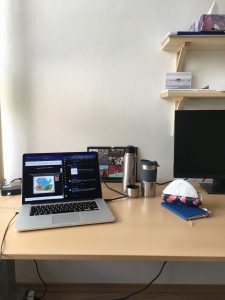Record attendance at New Approaches and Concepts in Microbiology
Written by event reporter Magdalena Wutkowska.
This year’s EMBO|EMBL Symposium: New Approaches and Concepts in Microbiology took place 7-9 July 2021. For the first time in its history, the meeting was held virtually, with a record of over 650 attendees from all over the world. The three day programme featured six sessions, 36 talks, discussion panels and countless posters showcasing the newest scientific advances in the field.
People from all over the globe are connecting with each other during this symposium. A common ground fades borders! …And the virtual format helps a little bit too ;). #EESMicrobiology #PerksofVirtualEvents pic.twitter.com/TZs7DktMkI
— EMBL Events (@EMBLEvents) July 8, 2021
This was my second time reporting during a virtual conference organised by EMBL, the first one being the EMBO Workshop: Molecular Mechanisms in Evolution and Ecology. It is interesting to note, even though the two meetings started with quite different scopes and aims, over time they began to resemble one another. Both meetings welcomed topics in microbiology that use cutting-edge techniques to disentangle and unravel microorganisms’ intricate worlds. The two meetings followed a similar format, which included a fairly intuitive online platform with links to presentations, posters, chats and a variety of other information prepared by the organisers.

Pre-symposium sessions
As part of New Approaches and Concepts in Microbiology, three special pre-symposium sessions explored transitioning to starting a lab, the nooks and crannies of publishing presented from the editor’s perspective and the future of scientific meetings in a post-pandemic world. The panelists shared many insightful ideas distilled from decades of experience in their work, and usually this type of knowledge is not so readily available, especially to early-career scientists.
From my personal perspective, the pre-symposium session on the future of scientific meetings was one of the most interesting, and is also a topic that will affect everyone in the scientific community. Gerlind Wallon representing EMBO shared results of a recent survey in which scientists were asked what they expected from meetings in the future and how did they perceive the online meetings that became a sudden reality for the scientific community, since the onset of the pandemic.
Scientific sessions
The scientific programme of the conference was fully packed with impressive and wide-ranging talks tackling most of the ‘big’ areas and pressing topics in microbiology. The first day was dedicated to systems biology, followed by the environment and antibiotics. The presentations on the second day dealt with regulation, signalling, protein machines and cell biology. The final day’s sessions covered novel approaches to study pathogenesis, infection, and microbiomes.
A common and reoccurring theme in many talks was the role of viruses in microbial systems and processes. The importance of that topic was strongly emphasised during the 1st day’s panel discussion on phage-microbe interactions, which highlighted some new and exciting perspectives on viruses.
The highlights from the conference have been instantly reported on Twitter using #EESMicrobiology. If the data presented during a talk has already been published, there is usually a link to the associated paper(s) in the tweet.
Onsite to virtual to hybrid?
Pandemics brought many tragic events, but on the other hand, it gave us a chance to rethink many issues and come up with alternatives for our actions. Virtual meetings are perhaps one of the broadly acquired tools, which in my opinion should further be used to make science more available for people and lower our impact on the environment. Will the next “New Approaches and Concepts in Microbiology” be held in a hybrid format?
Anyone following the EMBL conference from a SUP?. Conferences in times of Covid #EESMicrobiology #Science #standuppaddleboarding pic.twitter.com/DaCsJF5QPE
— Afombravo (@afonsbravo) July 9, 2021
Unexpected perks of attending online meetings from a favourite place!
This blogpost was written by Magdalena Wutkowka, Postdoc in Anne Daebeler’s Group, Soil and Water Research Infrastructure, Biology Centre CAS, České Budějovice (CZ).
Learn more on how to become an event reporter for EMBL Events.